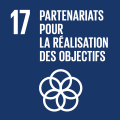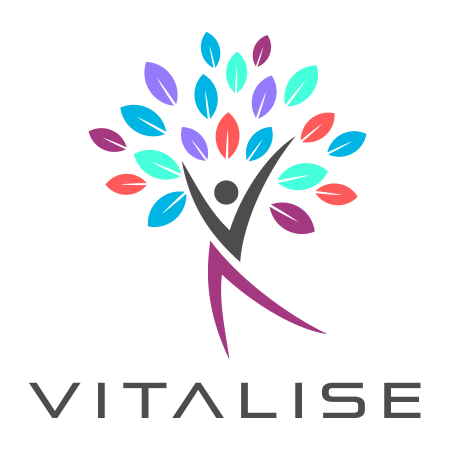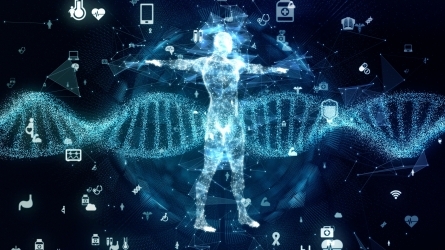
VITALISE 2023 Summer School on Living Labs
Description
The VITALISE 2023 Summer School on Living Labs, aims to provide researchers worldwide effective training both on how to implement the Living Lab methodology in their studies, as well as involve living labs Research Infrastructures and their services in their Health and Wellbeing research studies. Researchers in the Health and Wellbeing domain will have the opportunity to learn more about the open innovation and Living Lab tools, methods and services to improve their research and follow new scientific paths thanks to the support of the VITALISE high-experienced trainers on the Living Lab methodology. Participants will be also invited to access the VITALISE ICT tools and infrastructure within the project open calls to collaborate on scientific research with Living Labs recognized and labelled by the European Network of Living Labs.
The VITALISE 2023 Summer School on Living Labs, is provided by the VITALISE European Commission funded project, which interlinks living labs coming from the three major living lab networks in Europe:
- ENoLL, with 130 living lab members around the world, 41% of which are in the health and wellbeing domain.
- Forum LLSA comprised of 38 members, all of which in the health and wellbeing domain.
- EIT Health Living Labs, composed of 56 active Living Labs and an additional 37 that are in the process of joining, all of them in the health and wellbeing domain
By bringing together these three networks, VITALISE interconnects the majority of Living Labs across Europe, to cover all European geographical areas and beyond, across the spectrum of the Health and Wellbeing domain. The aim is to open up living lab infrastructures as a means to facilitate and promote research activities in the health and wellbeing domain in Europe and beyond by enabling in-person Transnational Access to seventeen living lab research infrastructures and supporting remote digital access to datasets (Virtual Access) of rehabilitation, transitional care and everyday life activities through harmonized processes and common tools. The project will also develop training methods towards the wider understanding and valorisation of Living Lab methodologies in the research community, such as a Fast Track Training service to researchers accessing our Living Labs from all over Europe and a Master Course for students eager to get the required knowledge and expertise to implement open innovation and Living Labs research and practice.
The first Edition of the VITALISE Summer School was held in Athens in July 2022 and focused on supporting researchers external to the project to improve their research by implementing the Living Lab methodologies and tools.
The second edition of the VITALISE Summer School in June 2023, will be devoted to support researchers, students, teachers and practitioners in implementing their own Living Lab project case by exploring the services provided by other researchers within the VITALISE Living Lab community, as well as in overcoming the usual challenges faced by Living Labbers. In order to do so, a series of case studies will be offered by the VITALISE teachers and researchers, who will support the development of hands-on cases for and with the participants to the Summer School.
Lectures with case studies will be combined with a practical approach to research through a series of hands-on workshops.
During registration to this summer school, participants will also have the opportunity to join a Bootcamp: 2 extra days (06 & 07 June 2023) of free training in Commercialization and Market Search. The Bootcamp will focus on a practical approach for understanding the path to market new products and services.
This project has received funding from the European Union's Horizon 2020 research and innovation programme under grant agreement No 101007990.
Objectifs
- Support European researchers and students, as well as teachers and practitioners, to acquire knowledge about the Living Labs methodologies, opportunities, challenges and services that can help them improv their career within the Health and ICT sectors.
- Contribute towards increasing access of external researchers, outside the VITALISE project, to research infrastructures made available by Living Labs around the world, with the ultimate goal of improving knowledge exchange and academic results.
- Co-create services based on open innovation and Living Lab methodologies together with stakeholders from all over Europe by increasing sharing of experiences and expertise, regarding mainly the health & wellbeing sector, but also relevant to industrial and technological innovation overall.
Activité s'adressant à
- Public en général
Directeurs

Francesca Spagnoli
European Network of Living Labs
Conférenciers

Diego Carvajal

leidy enriquez florez

Gorka Epelde Unanue

Jokin Garatea Gerrikagoitia
GAIA
Jokin Garatea, director del departamento Internacional de Gaia, Asociación Cluster TEIC del País Vasco. Es Licenciado en Derecho por la Universidad de Deusto y Diplomado en Economía Comunitaria por el Instituto Hispano-Alemán. Especialista en Comercio Exterior por el Departamento de Economía Aplicada de la Universidad del País Vasco en colaboración con el Gobierno Vasco. Coordinador de Proyectos del Fondo Vasco Aquitano para proyectos de fomento de I+DT de PYMEs del sector electrónico, cofinanciado por el Gobierno Vasco. Es miembro del Consejo Asesor del EnoLL (Red Europea de LL) y vice presidente del Ocean LL Transfronterizo desde junio de este año.

Eva Kehayia

Evdokimos Konstantinidis

Despoina Petsani

Miguel Rujas

Teemu Santonen
Tarifs inscription
| Matrícula | jusqu'au 02-06-2023 |
|---|---|
| 0 EUR |
Lieu de l'événement
Bizkaia
Bizkaia
Objectifs de développement durable
Chez UIK, nous voulons contribuer à la réalisation des objectifs de développement durable (ODD) 2030. Pour ce faire, nous avons identifié les objectifs auxquels nos programmes contribuent. Vous pouvez vérifier les objectifs ci-dessous.
L'Agenda 2030 est le nouvel agenda international de développement adopté en septembre 2015 par les Nations Unies. Cet agenda se veut un outil pour favoriser le développement humain durable sur toute la planète. L'éradication de la pauvreté, la réduction de l'inégalité et de la vulnérabilité et la promotion de la viabilité constituent ses principaux piliers. Il s'agit d'une chance unique de transformer le monde jusqu'en 2030 et de garantir les droits de l'homme à tous.
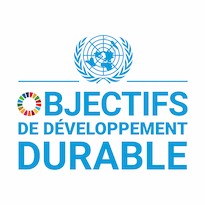
3 - Bonne santé et bien-être
Donner aux individus les moyens de vivre une vie saine et promouvoir le bien-être de tous à tout âge. Questions clés : couverture sanitaire universelle, santé sexuelle et procréative, diminution du nombre de personnes victimes d’accidents de la route, de la pollution et de produits chimiques, réduction du taux de mortalité maternelle et néonatale, fin des épidémies comme le SIDA, combattre l’hépatite et les maladies transmises par l’eau, prévention des drogues et de l’alcool, contrôle du tabac.
Plus d'informations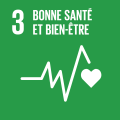
4 - Éducation de qualité
Veiller à ce que tous puissent suivre une éducation de qualité dans des conditions d’équité et promouvoir les possibilités d’apprentissage tout au long de la vie. Questions clés : enseignement gratuit, équitable et de qualité, accès égalitaire à une formation supérieure, éducation au développement durable, des installations éducatives adaptées aux personnes handicapées, cadres d’apprentissage sûrs, exempts de violence, inclusifs et efficaces.
Plus d'informations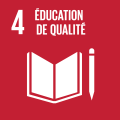
9 - Industrie, innovation et infrastructure
Mettre en place une infrastructure résiliente, promouvoir une industrialisation durable qui profite à tous et encourager l'innovation. Questions clés : infrastructures fiables, durables, résilientes et de qualité, industrialisation durable et qui profite à tous, modernisation, technologies et procédés industriels propres et respectueux de l'environnement, recherche scientifique et amélioration de la capacité technologique, accès universel des TIC.
Plus d'informations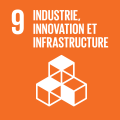
17 - Partenariats pour la réalisation des objectifs
Renforcer les moyens de mettre en œuvre et dynamiser le partenariat mondial pour le développement durable. Questions clés : mobilisation de ressources, consacrer 0,7 % du PIB à l'aide officielle aux pays en développement, dette extérieure, finances, coopération en matière technologique et d'innovation, technologies écologiquement rationnelles, création de capacités, système de commerce multilatéral universel, cohérence réglementaire et institutionnelle, disponibilité des données, suivi, indicateurs et reddition de comptes.
Plus d'informations